Classic Surveys on Greek Philosophy (5 vols.)
Digital Logos Edition
Overview
Greek philosophy is a difficult subject. You have to understand complex ideas, and you have to bridge the social and historical gaps between contemporary and Hellenistic culture. The Classic Surveys on Greek Philosophy collection provides resources for gaining competency in the historical context and intellectual world of the Greek philosophers. The authors identify individual thinkers and philosophical schools, explaining the contributions of each. The perennially relevant works in this collection will provide a foundation for life-long exploration of Greek philosophy, as well as its intellectual descendants.
With the Logos editions, these valuable volumes are enhanced by amazing functionality and features. Scripture and ancient-text citations link directly to English translations and original-language texts, and important terms link to dictionaries, encyclopedias, and a wealth of other resources in your digital library. Perform powerful searches with the Topic Guide to instantly gather relevant biblical texts and resources. Tablet and mobile apps let you take the discussion with you. With Logos Bible Software, the most efficient and comprehensive research tools are in one place, so you get the most out of your study.
Looking for more resources on ancient philosophy? Check out the Loeb Classical Library’s Works of Plato and Select Works of Aristotle.

Key Features
- Identifies how Greek history, culture, and geography contributed to philosophy
- Details the major issues and questions identified and addressed by Greek philosophers
- Shows the relevance of Greek philosophy for contemporary society and perennial philosophical questions
- Establishes a firm foundation for further philosophical study
Product Details
- Title: Classic Surveys on Greek Philosophy
- Volumes: 5
- Pages: 1,936
Individual Titles
- The Greek Philosophers by Alfred William Benn
- The Philosophy of Greece: Considered in Relation to the Character and History of Its People by Alfred William Benn
- The Fathers of Greek Philosophy by Renn Dickson Hampden
- A Brief History of Greek Philosophy by B. C. Burt
- A Study of Greek Philosophy by Ellen M. Mitchell
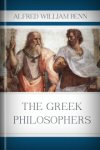
Originally published as a multivolume work in 1882, Alfred Benn’s The Greek Philosophers begins by asking how Greek society, on the heels of the Peloponnesian War and in social and political disarray, “developed all the highest human faculties to an extent possibly rivalled but certainly not surpassed by the collective efforts of that vastly greater population which now wields the accumulated resources of modern Europe.”
Benn documents Greece’s rise in the post war years, the development of Athenian intellectual life, and the significance of Socrates’ life, and then spends several chapters examining the life and thought of Plato and Aristotle. Benn teases out the differences between Platonic and Aristotelian philosophy, an analysis that includes a fascinating chapter on the systematization of Aristotle’s thought. Benn also examines groups such as the Stoics, and Sceptics, and individual philosophers including Plotinus, Epicurus, and Lucretius.
Alfred William Benn (1843–1915) was a leading scholar of the Greek and modern philosophy, and a prolific author. His works include A History of Modern Philosophy, The History of Ancient and Modern Philosophy, and The History of English Rationalism in the Nineteenth Century. A noted agnostic, he was an honorary associate of the Rationalist Press Association and a member of the London Positivist Society.
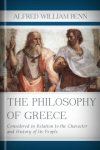
The Philosophy of Greece considers how the prephilosophical culture and geography of Greece contributed to its fourth-century-BC intellectual and philosophical climate. Benn focuses on the nation as a whole, and seeks to understand how the Greek experience in the physical world created what many believe was the world’s most intellectually oriented society.
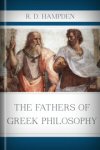
Greek philosophy established the central questions that perplex philosophers to this day. In The Fathers of Greek Philosophy Renn Hampden studies philosophy’s three foundational figures: Socrates, Plato, and Aristotle. Examining each figure’s historical context, life, and work, Hampden addresses questions such as the historicity of Socrates’ life and his unique student-pupil relationship with Plato. It also delineates the specific areas of philosophy in which each thinker contributed most significantly.
Renn Dickson Hampden (1793–1868) was regius professor of divinity and White’s Professor of Moral Philosophy at Oxford. He was educated in classics and mathematics at Oxford and was an Anglican clergyman, serving as the bishop of Hereford. Against John Henry Newman, he argued for non-Anglicans to attend Oxford in his Observations on Religious Dissent.
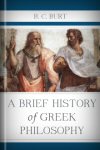
Providing a succinct but informative historical sketch of Greek philosophy, B. C. Burt’s work introduces readers to all of the major figures in Greek philosophy and includes preeminent figures such as Plato and Aristotle, and other figures such as Diogenes Laertius, Zeno, and Epictetus.
B. C. Burt was a fellow at Johns Hopkins University, and a distinguished historian of philosophy.
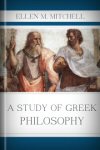
With a warm introduction by William Rounseville Alger, Ellen Mitchell’s A Study of Greek Philosophy presents a thorough review of Greek philosophy’s history, character, and significance. Mitchell covers every major figure and movement comprehensively, and aims to entice readers to deeper study of philosophy. Accessible and clear, Mitchell’s book is ideal for those unfamiliar with philosophy or those who wish to study philosophy for personal enrichment.
Ellen M. Mitchell (1838–1929) was an American philosopher, and a professor at the University of Denver. She was one of the first women to hold the title of lecturer at a university. Standing in the Platonic and Positivist tradition, she published many influential works, including The Philosophy of Pessimism, The Platonic Dialectic, and The Hidden Soul of Harmony.
Reviews
3 ratings

Forrest Cole
11/9/2021

SEONGJAE YEO
10/5/2019

Rev. Thomas S. McEwen B.Th; M.Div.
1/13/2018